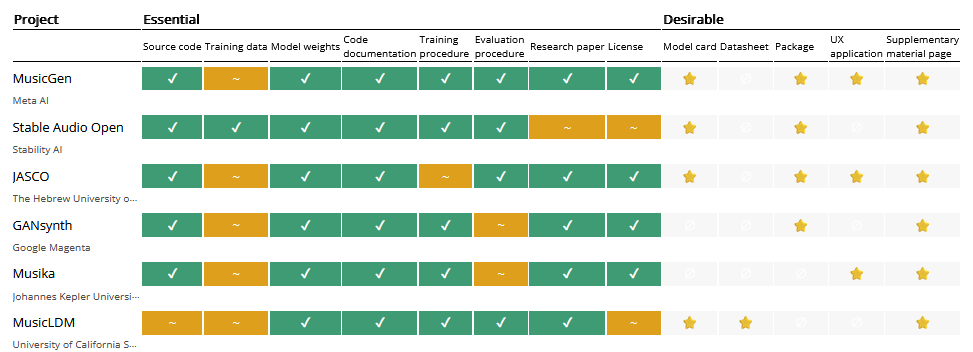We are pleased to see Opening Up ChatGPT, which served as the precursor to the OSAI Index, cited and expanded in MusGO: A Community-Driven Framework for Assessing Openness in Music-Generative AI. Inspired by our framework for analysing the openness of large language models, this work by Roser Batlle-Roca and colleagues of the Music Technology Group surveys openness and transparancy in a range of music-generative systems.

A valuable aspect of the MusGO study is their survey of the Music Information Retrieval community which highlights how practitioners weigh a range of openness attributes. For example, open code, model weights, and documentation were considered more essential than API access or packaging, leading the team to make a division between 'essential' and 'desirable' openness features. This aligns with our ongoing exploration into how openness criteria might be weighted differently across domains.
MusGO is a strong example of research collaboration in action, and a welcome contribution to the growing conversation around openness in generative AI. Our original framework was introduced precisely to allow these kinds of extensions: "because of its openness, the framework doubles as a possible infrastructure for auditing and a public service to foster AI literacy" (source). Meanwhile, openness breeds openness: building on the MUSGO efforts has enabled us to double the OSAI Index’s coverage of audio models. We encourage you to check out the MUSGO leaderboard.
- Roser Batlle-Roca, Laura Ibáñez-Martínez, Xavier Serra, Emilia Gómez, and Martín Rocamora (2025). “MusGO: A Community-Driven Framework for Assessing Openness in Music-Generative AI”. In Proceedings of the 26th International Society for Music Information Retrieval Conference, Daejeon, South Korea. Preprint: arxiv.org/abs/2507.03599